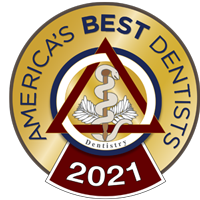Dental Restorations
Dental restorations are designed to restore the function and look of the teeth. Other than very non-invasive types of treatment such as whitening or micro-dentistry, teeth usually require some degree of preparation prior to the placement of a filling, crown, or bridge. How much preparation is needed depends upon the condition of the tooth and the nature of the restoration; the more aggressive the preparation, the higher the risk of post operative sensitivity. Some patients have adverse reactions with their gum tissue, lips, or cheeks (see below).
The products that we employ in dentistry today are designed with desensitization in mind. Still, if decay or a fracture is close to a nerve, a tooth can be problematic. We hope the information below is helpful:
- It's considered normal for a tooth with a large restoration to be sensitive, especially to hot and cold for several days. The pain should go away within several minutes after being stimulated.
- If you are allowed to take NSAID’s such as Advil or Motrin, these medications are great for tooth sensitivity. They can be taken every 4 to 6 hours for several days. Their anti-inflammatory affects are great for calming down a sensitive tooth.
- If you received anesthetic for your treatment, numbness can affect your ability to feel pressure. Your restoration may feel fine when you leave the office, but may feel “too high” once the anesthetic has worn off. A tooth that has more pressure on it than it’s supposed to, can become increasingly sensitive and may become loose under long term stress. Dental restorations are easily adjusted to rebalance your bite. Many times the sensitivity is gone within minutes.
- Danger signs to watch out for: intense pain that keeps you from sleeping or wakes you up, lingering pain upon stimulation (more than 5 minutes), hurts all the time even without specific stimuli, hot hurts it but cold makes it feel better. If you are experiencing any of these symptoms, you may have irreversible damage to the tooth’s nerve. Call us right away.
- If the anesthetic given resulted in a numb feeling on your lips, tongue, cheek, or gums, you have to be careful eating or chewing until feeling returns. Many people injure themselves by biting into a lip or cheek and not knowing it due to the numbness. It’s not till after the anesthetic has worn away that a patient becomes aware of the damage. Also, some tissues in the mouth do not respond well to dental treatment. Oral tissue can develop canker sores and ulcers or become very inflamed by even gentle contact. Restorations that are next to or under the gums can irritate them, while work that is done toward the back of the mouth can cause irritation to the cheeks and parotid gland ducts. A great product to help sore, inflamed tissues feel better is called Zilactin which is available over the counter. If problems persist for more than a week, please give the office a call.
Appointments
We love meeting new faces. Feel free to call (847) 695-1300 for an appointment.
Already a patient...refer a friend and take part in our Referral Rewards program.
Hours
We are open three nights a week, Saturdays, and over lunch twice a week. Special arrangements can also be made. Our full schedule is listed below.
Monday : 8am - 12pm & 1pm - 8pm
Tuesday and Thursday: 12pm - 7pm
Friday: 8am - 12pm & 1pm-3pm
Saturday: 8am - 12pm
Wednesday: by special appointment only



